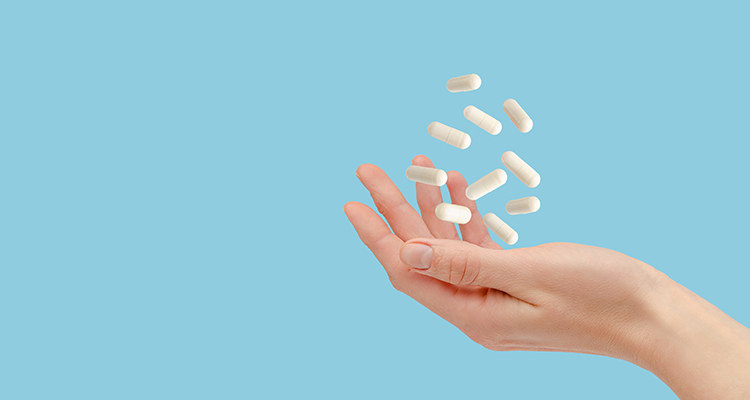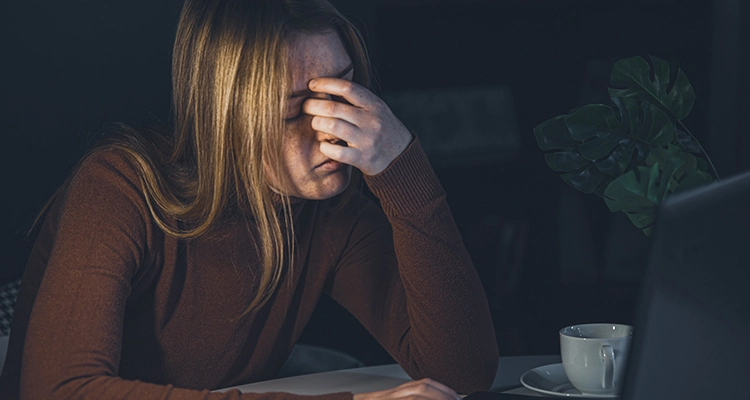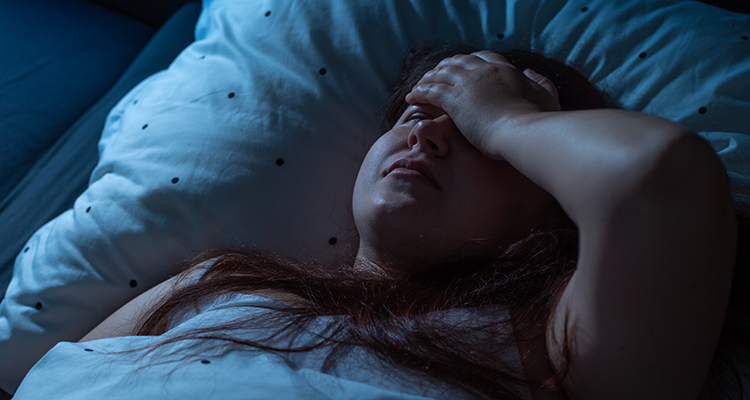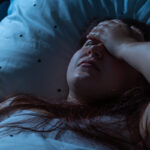Can Venlafaxine Be Used to Treat Insomnia?
Can’t sleep? If so, join the crowd. Up to 30% of young and middle-aged adults suffer from chronic insomnia. Up to 48% of older adults also suffer from occasional insomnia. And, roughly 10% of insomniacs report experiencing daytime fatigue, irritability, confusion, and/or disorientation upon waking the next morning. Although distressing, it is especially concerning when you also suffer from anxiety or depression.

Anxiety and depression symptoms (i.e., feelings of hopelessness and helplessness, roaming and/or intrusive thoughts, continuous trepidation, endless despair, excessive worry, unrelenting nervousness, extreme fears or phobias, etc.) can keep you awake all night or cause you to awaken several times at night. When you have anxiety or depression your mind is constantly working – worrying about something that happened or something that could happen.
The thing is most of the time, these upsetting thoughts, fears, and worries are illogical. However, for many people, who have one or both of these conditions (anxiety or depression), the emotional pain is too much to bear, so they seek treatment. Depression and anxiety treatments typically involve therapy, medication(s), and/or self-help tools. One of the most effective antidepressants on the market is venlafaxine. In fact, researchers have found that venlafaxine is one of the premier medications for depression, anxiety, and other “off-label” conditions.
Two of the main side-effects of venlafaxine are insomnia and “sleepiness.” So, although, this medication could help you get some much-needed zzz – it could also have the opposite effect, triggering or worsening insomnia. However, the good news is you can still get a good night’s sleep, while on venlafaxine, simply by making a few bedtime tweaks.
If you suffer from insomnia and depression or anxiety and are thinking of taking venlafaxine to combat both issues (anxiety or depression and insomnia), look no more because this article will provide you with “ins and outs” of this medication so you can finally get the sleep you deserve!
Content
What is Venlafaxine?
Venlafaxine, the generic name of Effexor or Effexor XR, is a serotonin-norepinephrine reuptake inhibitor (SNRI) antidepressant. SNRIs are similar to SSRIs in that both medications have the same serotonergic adverse effects. They vary in the sense that SNRIs have an added function – noradrenergic adverse effects. However, researchers have been unable to discern noticeable long-term differences between SSRIs and SNRIs, like venlafaxine, when it comes to treating depression and other mood and anxiety conditions.

Venlafaxine is a long-lasting medication that is primarily prescribed for mood disorders like major depressive disorder (clinical depression). However, it is also sometimes prescribed for social anxiety disorder, generalized anxiety disorder (GAD), and panic attacks or panic disorder. This antidepressant increases your production of serotonin and norepinephrine, hormones/neurotransmitters (chemical brain messengers) responsible for mental stability. In other words, venlafaxine helps correct “out of sync” brain chemicals in people, who are struggling with depression or anxiety.
Is Venlafaxine Used for Any “Off-Label” Conditions?
Yes!
Venlafaxine is sometimes used to treat “off-label” conditions and ailments, such as hot flashes and night sweats in perimenopausal and menopausal women. It may also be prescribed (“off label”) to people, who are taking chemotherapy for breast cancer.
Is Venlafaxine Offered in Pill Forms?
Yes, venlafaxine is offered in tablets and capsules.
How Much Venlafaxine Should I Take?
The amount of venlafaxine that you should take largely depends on your weight and specific condition (anxiety or depression). The amount of venlafaxine you should take for “off-label” conditions is based on a variety of factors, such as your gender, weight, body chemistry, condition, and concerns.

Listed below are the “typical” dosages for depression and anxiety conditions:
Dosage for Adults with Depression
Immediate Release
- Starting Dose – 37.5 mg orally 2x a day or 25 mg orally 3x a day
- Maintenance Dose – 75 to 150 mg orally, per day, divided into two doses
- Maximum Dose – 225 mg, orally, per day (moderately depressed – outpatient)
- Maximum Dose – 375 mg, orally, per day (severely depressed – inpatient)
Extended-Release
- Starting Dose – 75 mg orally 1x a day
- Maintenance Dose – 75 to 225 mg orally 1x a day
- Maximum Dose – 225 mg, orally, per day (moderately depressed – outpatient)
- Maximum Dose – 375 mg, orally, per day (severely depressed – inpatient)
Dosage for Adults with Generalized Anxiety Disorder
Extended-Release
- Starting Dose – 75 mg orally 1x a day
- Maintenance Dose – 75 to 225 mg orally 1x a day
- Maximum Dose – 225 mg orally, per day
Dosage for Adults with Social Anxiety Disorder and Social Phobia
Extended-Release
- 75 mg orally 1x a day
Dosage for Adults with Panic Disorder and Panic Attacks
Extended-Release
Starting Dose – 37.5 mg orally 1x a day for 7 days
Maintenance Dose – 75 to 225 mg orally 1x a day
Maximum Dose – 225 mg, orally, per day
How Should Venlafaxine Be Taken?
Venlafaxine should be taken exactly as your doctor prescribes it. In other words, follow the directions on your prescription bottle and read the accompanying medication information sheets.

Listed below are other venlafaxine instructions:
- Always take with venlafaxine with food.
- Take venlafaxine at the same time each day.
- Swallow the extended-release capsules or tablets whole (without crushing or chewing them or breaking them open).
- Exception – If you have a hard time swallowing the pills whole, open them and mix the venlafaxine powder in applesauce or pudding. Swallow the mixture immediately.
- Do not abruptly stop venlafaxine because doing so could lead to adverse effects, such as irritability, agitation, mental confusion, tingling or lightning bolt sensations in your fingers and toes, etc. Ask your doctor how you can “wean off” the medication before stopping it.
- It may take several weeks before you experience a noticeable improvement in your depression or anxiety.
- You will need to have frequent blood pressure checks while taking venlafaxine.
- Venlafaxine can give you a false positive urine-based drug test, so notify all your doctors and the lab staff that you are taking the medication.
What Should I Do If I Miss a Dose?
If you miss a dose of venlafaxine, take it as soon as possible. However, if it is close to your next dose, skip the missed dose. Do not combine the two doses (missed and current). If you are taking the extended-release (ER) capsules or tablets do not take more than one dose a day.
Is There Anything I Should Know Before Taking Venlafaxine?
- Do not take this medicine if you are allergic to venlafaxine or desvenlafaxine (Pristiq) or if you have unchecked narrow-angle glaucoma.
- Do not use venlafaxine 7 days before or 14 days after using an MAO inhibitor, such as linezolid, methylene blue injection, phenelzine, or tranylcypromine. This is important because combining MAO inhibitors with venlafaxine can cause a life-threatening interaction.
- Inform your doctor if you are currently taking a stimulant, opioid, herbal product, anti-nausea medications, or another antidepressant. Also, notify him or her if you have Parkinson’s disease, migraine headaches, or chronic infections. Venlafaxine may interact with the medications and conditions above leading to serotonin syndrome.
- Refrain from taking venlafaxine if you are under the age of 18. It has not been approved for use in minors.
- Do not start or abruptly stop venlafaxine without consulting your doctor first.
- Do not breastfeed while taking venlafaxine because it could transfer to your baby through your breastmilk.
- If you plan to have surgery soon (i.e., heart surgery, dental surgery, etc.), alert the doctor or dentist that you are taking venlafaxine.
- Venlafaxine can cause drowsiness and affect your judgment, thought processes, and/or motor skills. Thereby, it is important that you not drive a car or operate machinery until you know how this medication will affect you.
- Venlafaxine can trigger hypertension or high blood pressure. Thus, it is important to have your blood pressure checked before you start taking the medication (to establish a baseline) and while you are on it (to document any changes).
- Venlafaxine can cause angle-closure glaucoma (a condition that occurs when fluid is abruptly blocked, making it hard or impossible for it to flow out of the eye. The result? A quick and significant increase in eye pressure that can lead to vision loss. Thus, it is important to ask your doctor for an eye exam if you notice nausea, eye pain, or changes in your vision (i.e., colored rings, zig-zags, light bursts, and/or eye edema or redness in or around the eye) while taking this medication.

Could My Medications Interact with Venlafaxine?
Yes, it is possible.

Combining venlafaxine with sedatives can enhance the effects of both medications. Consult your doctor before taking opioids, sleeping pills, muscle relaxers, anti-seizure medications, and/or antidepressants or anti-anxiety meds with venlafaxine.
Share your medication list with your doctor and refrain from mixing venlafaxine with the drugs listed below:
- SSRIs Antidepressants
- Cimetidine
- Tramadol
- St. John’s Wort
- Tryptophan or L-Tryptophan
- Diet or Weight Loss Pills (i.e., Phentermine)
- Blood Thinners (i.e., Warfarin or Coumadin)
- Medications Used to Treat Mood Disorders, Cognitive Conditions, or Mental Health Conditions (i.e., Buspirone, Lithium, etc.)
- Migraine Headache Medications (i.e., Eletriptan or Relpax, Sumatriptan, Zolmitriptan, etc.)
Are There Any Risk Factors Associated with Taking Venlafaxine?
Yes, some factors can make you especially vulnerable to venlafaxine’s adverse effects.

These risk factors include:
- Bipolar Disorder
- Liver Disease
- Kidney Disease
- Cardiovascular “Heart” Disease
- Hypertension or High Blood Pressure
- High Cholesterol Levels
- Diabetes
- Glaucoma
- Thyroid Disorder
- Seizures
- Low Platelets or Bleeding Problems
- Low Blood Sodium Levels
- Suicidal Thoughts and Attempts
- Pregnancy (Tak
- ing this medicine during pregnancy could harm your fetus)
Note: Tell your doctor if you have ever experienced one of the conditions listed above.
Is There Anything I Should Avoid While Using Venlafaxine?
Yes, there are some things you should avoid while taking venlafaxine.

These things include:
- Alcohol
- Nonsteroidal anti-inflammatory drugs (NSAIDs) like aspirin, ibuprofen, naproxen, Advil, Aleve, Motrin, etc. Combining NSAIDs with venlafaxine can lead to bruising and bleeding. So, ask your doctor before taking NSAIDs.
- Driving a vehicle or operating machinery until you know how the medication will affect you (i.e., impaired thoughts and behaviors)
What Are the Side-Effects of Venlafaxine?
Like other antidepressants, Venlafaxine comes with a host of side effects that you should be aware of, such as:

- An allergic reaction (i.e., skin rashes or hives, shortness of breath, facial edema (swelling) – i.e., face, lips, tongue, or throat.
- Mood or behavioral changes
- Anxiety or panic attacks
- Insomnia or “sleeplessness”
- Sleepiness or drowsiness
- Impulsivity, frustration, agitation, hostility, aggression, restlessness, hyperactivity, escalating depression
- Self-harm behaviors or suicide ideation (thoughts and attempts)
Call your doctor immediately if you have the following symptoms:
- Blurry Vision, Blindness, Eye Redness and Pain, Zig-Zags or Light Halos in Your Vision
- Coughing
- Tight Chest or Chest Pain
- Shortness of Breath
- Skin Rashes or Hives
- Itchiness
- Swallowing Difficulties
- Elevated Heart Rate – i.e., Fast, Pounding, or Irregular Heartbeats
- Petechiae or Small Purple Spots on Your Skin
- Fevers
- Heavy Sweating
- Mental Confusion
- Severe Muscle Stiffness
- Jitteriness, Anxiety, or Agitation
- Gastrointestinal Distress – i.e., Nausea, Vomiting, Constipation, Upset Stomach and/or Diarrhea
- A Lack of Coordination
- Terrifying Delusions and Hallucinations
- Coma or Loss of Consciousness
- Seizures or Convulsions
- Excessive or Abnormal Bleeding or Bruising – i.e., Chronic Nosebleeds, Heavy Menstrual Periods, Bleeding Gums, etc.
- Low Blood Sodium – i.e., Headaches, Mental Confusion, Forgetfulness or Poor Memory, Distorted Thinking, General Weakness, Unsteadiness, etc.
- Extreme Nervous System Responses – i.e., Rigid Muscles, High Fevers, Excessive Perspiration or Sweating, Mental Confusion, Accelerated or Irregular Heartbeats, Tremors or Shakiness, Lightheadedness, etc.
- Severe, Non-Stop Headaches or Migraines
- Dizziness, Drowsiness, or Lethargy
- Insomnia, “Sleeplessness,” Nightmares, or Night Terrors
- Sudden Changes in Weight or Appetite
- Dry “Cotton” Mouth
- Excessive Yawning
- Sexual Issues or Sexual Dysfunctions
Also, seek medical attention immediately if you think you have serotonin syndrome:
- Anger or Agitation
- Delusions or Hallucinations
- Fevers
- Excessive Perspiration (Sweating)
- Shivering, Shakiness, or Trembling
- Elevated Heart Rate
- Muscle Stiffness
- Nervousness
- Loss of Coordination or Clumsiness
- Nausea
- Vomiting
- Diarrhea
Note: Venlafaxine can lead to failure to thrive, delayed growth, and poor weight gain in some children. Thus, if your child is taking venlafaxine, his or her pediatrician should carefully monitor his or her growth and development. Talk with your child’s pediatrician if you are considering giving it to your child.
Is It Possible to Overdose on Venlafaxine?
Yes, it is.

Listed below are the signs of a venlafaxine overdose:
- Lightheadedness
- Nausea
- Vomiting
- A Burning Sensation
- A Tingling Sensation or Numbness in Your Hands and Feet
- An Oversized Pupil (Black Dot in the Center of Your Eye)
- Muscle Weakness and Pain
- Alternating Hot Flashes and Chills
- Sleepiness
- Mental Confusion or Disorientation
- Seizures
- Accelerated, Slow, or Irregular Heartbeats
- Coma
Can Venlafaxine Be Taken for Insomnia?
Yes, it can, however, it is important to exercise caution when taking it for this purpose.

Studies suggest that venlafaxine can cause insomnia or “sleeplessness” in some people (4% to 8%) and “sleepiness” in others (12% to 31%). So, although it can improve sleep in some people, the “sleepiness” is actually a side-effect of the medication. In other words, venlafaxine is not designed to “cure,” “correct” or improve “sleeplessness” or sleep disorders, like insomnia.
However, it is designed to improve mood disorders (i.e., depression) and anxiety disorders (i.e., social anxiety, generalized anxiety disorder (GAD), panic disorder, panic attacks, PTSD, phobias, etc.).
And, although more people experience “sleepiness” and fatigue while taking venlafaxine, it is still important to weigh your “pros and cons” with your doctor and loved ones before taking this medication to “fix” or improve your insomnia. So, even though venlafaxine may help ease anxiety and depression symptoms, it could cause a host of other problems, so it is not the ideal insomnia remedy.
Researchers suggest that people, who take venlafaxine for depression, anxiety, or “off-label conditions may experience increased wake times (insomnia), sleep pattern disturbances, which can include nightmares or night terrors, shorter REM sleep, and/or abnormal leg movements (jerkiness or restless legs).
So, if you already suffer from insomnia or if your sleep quality has recently improved, you may want to ask your doctor to prescribe another medication for your condition because you will not how you will react to venlafaxine until you start taking it.
Venlafaxine Reviews
Listed below are venlafaxine reviews from people who take it or who have taken it in the past:

Sleepiness & Fatigue
Anonymous
“I have been taking venlafaxine XR, 150mg, for several months now. I am currently experiencing constant fatigue and/or sleepiness throughout the day. It is interfering with my quality of life. I have talked to my family, doctor, and psychiatrist several times about it, but they seem to dismiss it!
All my blood tests are within the normal ranges. But I still have sleep apnea and have to use a CPAP mask every night. However, my fatigue has increased within the last few months. Could this drug be causing this? I also take bupropion, XL, 300 mg. I take venlafaxine and bupropion in the mornings. Thanks for your help!”
Boz
“I suffer from anxiety and depression. Effexor made me so tired that I couldn’t function. So, I was switched to Pristiq, which claimed to basically be the same thing. Unlike Venlafaxine, Pristiq worked great for me and I am not fatigued anymore. I take Pristiq in the mornings and I feel great all day.”
Seamus
“I’m on 225 mg Venlafaxine and I am still dysfunctional. In other words, I am still depressed. I also suffer from impossible fatigue and a loss of libido. Perhaps, it’s because I am old and unfit. I’m also taking Metformin, Flecainide, and Verapamil. I feel like I have something just behind and slightly above my eyes, causing me to constantly feel sleep and in need of a nap.”
Insomnia and Sleeplessness
Clazzy
“I started my venlafaxine 37.5 mg once a day. It seems to be helping tremendously with my severe anxiety, even after 4 days. BUT…I have terrible insomnia. It’s a nightmare!
Does anyone know if insomnia eases? Does it increase as I increase my dose? I have toddlers, so I NEED to sleep!!! I was awake until 2:30 am this morning, then I had to take a Zopiclone. I don’t like taking Zopiclone pills and I’m not sure if I want to take them anymore because I do not find them all that effective in helping me fall and stay asleep at night.”
Matt
“I had to stop taking venlafaxine because of insomnia. While on it, I NEVER slept and it was hell! I didn’t sleep much for 4 days and then my doctor took me off of venlafaxine and prescribed me benzos to help me sleep. It took a good three weeks for me to be able to sleep again.”
CD
“I started taking venlafaxine yesterday morning. I was worried about having nightmares, but I wasn’t asleep long enough to have nightmares so I needn’t have worried.
I am a long-term user of fluoxetine, recently changed to mirtazapine as fluoxetine was no longer effective. Mirtazapine was chosen because I wasn’t sleeping. However, it caused weight gain, so I was changed to venlafaxine. Venlafaxine is causing me to be restless and have a broken sleep pattern.”
How Can I Ease My Insomnia Symptoms While Taking Venlafaxine?
Well, one good way to get some quality sleep is to sign-up for the insomnia treatment program, Somnus Therapy. Somnus Therapy offers insomniacs a variety of resourceful tools, such as cognitive restructuring tools, CBT-I, guided sleep meditations, sleep sounds, expertly written articles, and expert-led classes designed to banish your insomnia and improve your sleep quality. Somnus Therapy is not only highly affordable but also easily accessible. This sleep program can offer you a lifetime of support and tools to help you maintain your sleep success!





















